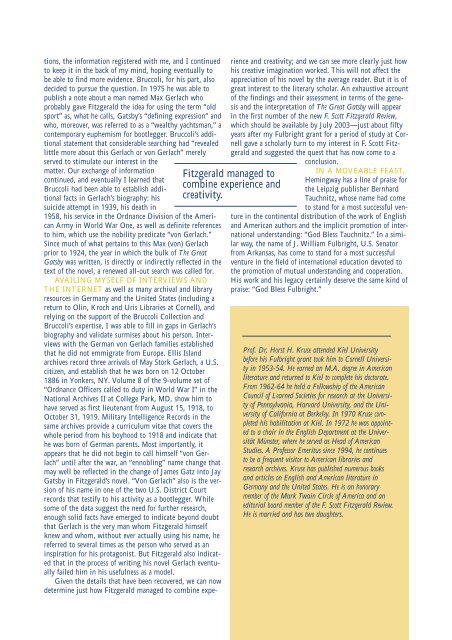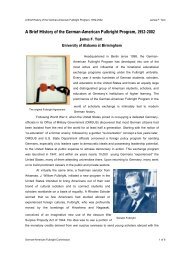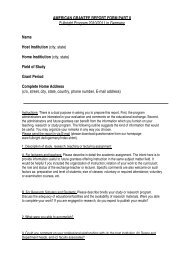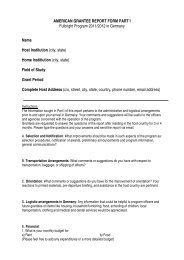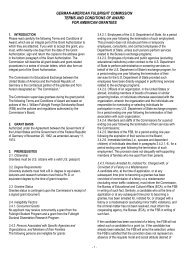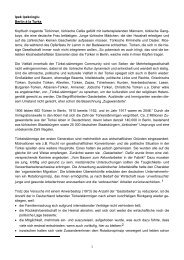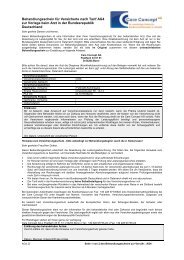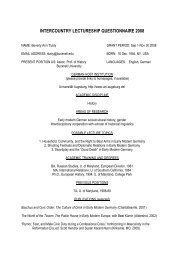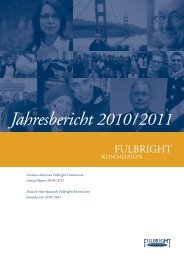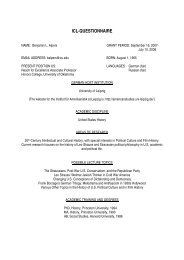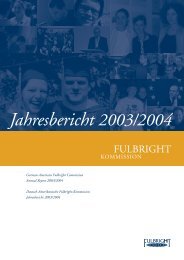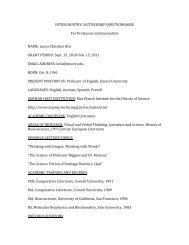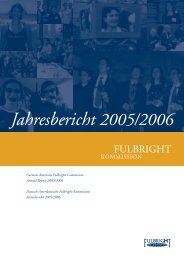The First Class of Fulbrighters - Fulbright-Kommission
The First Class of Fulbrighters - Fulbright-Kommission
The First Class of Fulbrighters - Fulbright-Kommission
You also want an ePaper? Increase the reach of your titles
YUMPU automatically turns print PDFs into web optimized ePapers that Google loves.
tions, the information registered with me, and I continued<br />
to keep it in the back <strong>of</strong> my mind, hoping eventually to<br />
be able to find more evidence. Bruccoli, for his part, also<br />
decided to pursue the question. In 1975 he was able to<br />
publish a note about a man named Max Gerlach who<br />
probably gave Fitzgerald the idea for using the term “old<br />
sport” as, what he calls, Gatsby’s “defining expression” and<br />
who, moreover, was referred to as a “wealthy yachtsman,” a<br />
contemporary euphemism for bootlegger. Bruccoli’s additional<br />
statement that considerable searching had “revealed<br />
little more about this Gerlach or von Gerlach” merely<br />
served to stimulate our interest in the<br />
matter. Our exchange <strong>of</strong> information<br />
continued, and eventually I learned that<br />
Bruccoli had been able to establish additional<br />
facts in Gerlach’s biography: his<br />
suicide attempt in 1939, his death in<br />
1958, his service in the Ordnance Division <strong>of</strong> the American<br />
Army in World War One, as well as definite references<br />
to him, which use the nobility predicate “von Gerlach.”<br />
Since much <strong>of</strong> what pertains to this Max (von) Gerlach<br />
prior to 1924, the year in which the bulk <strong>of</strong> <strong>The</strong> Great<br />
Gatsby was written, is directly or indirectly reflected in the<br />
text <strong>of</strong> the novel, a renewed all-out search was called for.<br />
AVAILING MYSELF OF INTERVIEWS AND<br />
THE INTERNET as well as many archival and library<br />
resources in Germany and the United States (including a<br />
return to Olin, Kroch and Uris Libraries at Cornell), and<br />
relying on the support <strong>of</strong> the Bruccoli Collection and<br />
Bruccoli’s expertise, I was able to fill in gaps in Gerlach’s<br />
biography and validate surmises about his person. Interviews<br />
with the German von Gerlach families established<br />
that he did not emmigrate from Europe. Ellis Island<br />
archives record three arrivals <strong>of</strong> May Stork Gerlach, a U.S.<br />
citizen, and establish that he was born on 12 October<br />
1886 in Yonkers, NY. Volume 8 <strong>of</strong> the 9-volume set <strong>of</strong><br />
“Ordnance Officers called to duty in World War I” in the<br />
National Archives II at College Park, MD, show him to<br />
have served as first lieutenant from August 15, 1918, to<br />
October 31, 1919. Military Intelligence Records in the<br />
same archives provide a curriculum vitae that covers the<br />
whole period from his boyhood to 1918 and indicate that<br />
he was born <strong>of</strong> German parents. Most importantly, it<br />
appears that he did not begin to call himself “von Gerlach”<br />
until after the war, an “ennobling” name change that<br />
may well be reflected in the change <strong>of</strong> James Gatz into Jay<br />
Gatsby in Fitzgerald’s novel. “Von Gerlach” also is the version<br />
<strong>of</strong> his name in one <strong>of</strong> the two U.S. District Court<br />
records that testify to his activity as a bootlegger. While<br />
some <strong>of</strong> the data suggest the need for further research,<br />
enough solid facts have emerged to indicate beyond doubt<br />
that Gerlach is the very man whom Fitzgerald himself<br />
knew and whom, without ever actually using his name, he<br />
referred to several times as the person who served as an<br />
inspiration for his protagonist. But Fitzgerald also indicated<br />
that in the process <strong>of</strong> writing his novel Gerlach eventually<br />
failed him in his usefulness as a model.<br />
Given the details that have been recovered, we can now<br />
determine just how Fitzgerald managed to combine expe-<br />
rience and creativity; and we can see more clearly just how<br />
his creative imagination worked. This will not affect the<br />
appreciation <strong>of</strong> his novel by the average reader. But it is <strong>of</strong><br />
great interest to the literary scholar. An exhaustive account<br />
<strong>of</strong> the findings and their assessment in terms <strong>of</strong> the genesis<br />
and the interpretation <strong>of</strong> <strong>The</strong> Great Gatsby will appear<br />
in the first number <strong>of</strong> the new F. Scott Fitzgerald Review,<br />
which should be available by July 2003—just about fifty<br />
years after my <strong>Fulbright</strong> grant for a period <strong>of</strong> study at Cornell<br />
gave a scholarly turn to my interest in F. Scott Fitzgerald<br />
and suggested the quest that has now come to a<br />
conclusion.<br />
IN A MOVEABLE FEAST,<br />
Hemingway has a line <strong>of</strong> praise for<br />
the Leipzig publisher Bernhard<br />
Tauchnitz, whose name had come<br />
to stand for a most successful venture<br />
in the continental distribution <strong>of</strong> the work <strong>of</strong> English<br />
and American authors and the implicit promotion <strong>of</strong> international<br />
understanding: “God Bless Tauchnitz.” In a similar<br />
way, the name <strong>of</strong> J. William <strong>Fulbright</strong>, U.S. Senator<br />
from Arkansas, has come to stand for a most successful<br />
venture in the field <strong>of</strong> international education devoted to<br />
the promotion <strong>of</strong> mutual understanding and cooperation.<br />
His work and his legacy certainly deserve the same kind <strong>of</strong><br />
praise: “God Bless <strong>Fulbright</strong>.”<br />
Fitzgerald managed to<br />
combine experience and<br />
creativity.<br />
Pr<strong>of</strong>. Dr. Horst H. Kruse attended Kiel University<br />
before his <strong>Fulbright</strong> grant took him to Cornell University<br />
in 1953-54. He earned an M.A. degree in American<br />
literature and returned to Kiel to complete his doctorate.<br />
From 1962-64 he held a Fellowship <strong>of</strong> the American<br />
Council <strong>of</strong> Learned Societies for research at the University<br />
<strong>of</strong> Pennsylvania, Harvard University, and the University<br />
<strong>of</strong> California at Berkeley. In 1970 Kruse completed<br />
his habilitation at Kiel. In 1972 he was appointed<br />
to a chair in the English Department at the Universität<br />
Münster, where he served as Head <strong>of</strong> American<br />
Studies. A Pr<strong>of</strong>essor Emeritus since 1994, he continues<br />
to be a frequent visitor to American libraries and<br />
research archives. Kruse has published numerous books<br />
and articles on English and American literature in<br />
Germany and the United States. He is an honorary<br />
member <strong>of</strong> the Mark Twain Circle <strong>of</strong> America and an<br />
editorial board member <strong>of</strong> the F. Scott Fitzgerald Review.<br />
He is married and has two daughters.


